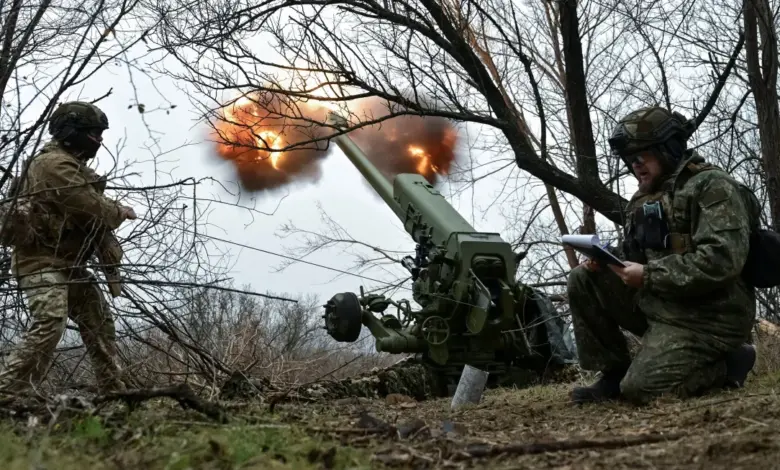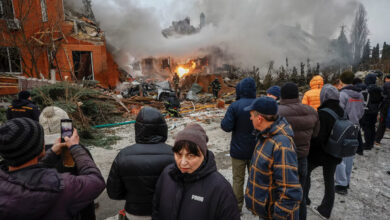
The continent has been scrambling to respond after US President Donald Trump announced negotiations would begin “immediately” on ending the conflict following a phone call with Russia’s Vladimir Putin, and Trump’s Russia-Ukraine envoy Keith Kellogg saying Europe would not be involved.
The summit was confirmed by the Elysée Palace, which said French President Emmanuel Macron would hold an “informal” meeting Monday with “the heads of government of Germany, the United Kingdom, Italy, Poland, Spain, the Netherlands and Denmark, as well as the President of the European Council, the President of the European Commission and the Secretary General of NATO.”
UK Prime Minister Keir Starmer called it a “once in a generation” moment for national security.
“The UK will work to ensure we keep the US and Europe together,” Starmer was quoted as saying in a statement released by Downing Street on Saturday. “We cannot allow any divisions in the alliance to distract from the external enemies we face.”
News of the emergency summit follows US President Donald Trump and his top officials upending in recent days what had largely been a united front between Washington and its European NATO allies on supporting Ukraine against Russia’s invasion, which is nearing its third anniversary.
Trump spoke with both Russian leader Vladimir Putin and Ukrainian President Volodymyr Zelensky last week, while his top administration officials visited Europe and presented elements of a vision for ending the war that appeared to allow for key concessions to Russia and raised fears that Ukraine could be marginalized and Europe left out of peacemaking.
The European diplomatic efforts come after new US Defense Secretary Peter Hegseth, speaking in Brussels on Wednesday, said it was unrealistic that Kyiv should join NATO or return to its pre-2014 sovereign borders – an apparent break with Washington’s previous stance and one that critics said gave key concessions to Putin before talks even began.
A day later, Hegseth hedged on those comments, saying “everything is on the table” in negotiations between the two countries. US Vice President JD Vance also warned Thursday the US could hit Russia with economic and military “tools of leverage” if Moscow doesn’t negotiate a peace deal in good faith.
Kellogg said in Munich that Ukraine would be at the table for peace negotiations. But while other European governments’ positions would be taken into consideration, Kellogg said, they would not be participants.
Trump has long been critical of NATO, calling for European partners to spend more on defense and decrying what he sees as an unbalanced relationship between the two sides of the Atlantic with little benefit to the US.
Vance also played into concerns of a deepening breach between Europe and the US under Trump while in Munich on Friday. In a speech, he reprimanded European leaders, telling them that the biggest threat to their security was “from within,” rather than China or Russia, and pointing to what he claimed was their suppression of free speech and refusal to work with hard-right parties in government.
In a post on X Sunday, Kaja Kallas, the EU’s foreign policy chief, said the bloc would “soon come up with new initiatives” on supporting Ukraine and bolstering European security.
Push for peace talks
The US appears tis moving ahead with its own peace process, with administration figures set to meet with senior Russian officials to begin talks aimed at ending the war, according to multiple sources.
National security adviser Mike Waltz, Secretary of State Marco Rubio and Middle East envoy Steve Witkoff are expected to travel to Saudi Arabia for the meeting, two sources familiar with the plans told CNN. One of the sources said the meeting will take place in the coming days.
The sources declined to say which Russian officials would be in attendance, but CNN has previously reported the Kremlin is assembling a high-level negotiating team to engage in direct talks with the US, including top-level political, intelligence and economic figures, and Kirill Dmitriev, the Russian official who played a key behind-the-scenes role in a recent US prisoner release deal.
Trump’s call with Putin and the push to work with Russia have also raised Ukrainian fears of being excluded from talks deciding the fate of their own country. Zelensky in recent days lamented that the US president spoke with Putin before him.
Speaking to CNN’s Christiane Amanpour on stage at the Munich Security Conference, Zelensky conceded that he was “not happy” that Trump’s first call was with Putin. The Ukrainian leader warned that it would be even “more dangerous” however if Trump meets in person with the Russian president before him.
Trump hasn’t provided any commitment to meeting Zelensky first, the Ukrainian president told CNN. The US president did however understand the need to “meet urgently” to discuss “concrete plans” to end the war, Zelensky added.
Zelensky sat down with Vance Friday in Munich for what the Ukrainian leader later called a “substantive meeting.”
The following day, in an address to the security conference, Zelensky said his country “will never accept deals made behind our backs without our involvement. And the same rule should apply to all of Europe.”
The wartime Ukrainian leader also referenced the potential for Europe to be excluded from the new peace push.
“A few days ago, President Trump told me about his conversation with Putin. Not once did he mention that America needs Europe at that table. That says a lot,” he said.
This story has been updated.
CNN’s Betsy Klein, Samantha Waldenberg, Jennifer Hansler, Mariya Knight, Caitlin Danaher and Niamh Kennedy contributed to this report.




